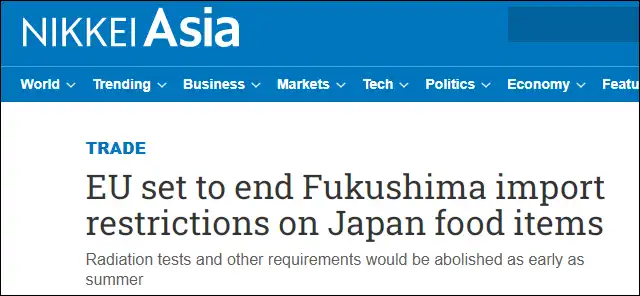EU will withdraw restrictions on food imports from Fukushima?
- Normal Liver Cells Found to Promote Cancer Metastasis to the Liver
- Nearly 80% Complete Remission: Breakthrough in ADC Anti-Tumor Treatment
- Vaccination Against Common Diseases May Prevent Dementia!
- New Alzheimer’s Disease (AD) Diagnosis and Staging Criteria
- Breakthrough in Alzheimer’s Disease: New Nasal Spray Halts Cognitive Decline by Targeting Toxic Protein
- Can the Tap Water at the Paris Olympics be Drunk Directly?
EU will withdraw restrictions on food imports from Fukushima?
- Should China be held legally responsible for the US’s $18 trillion COVID losses?
- CT Radiation Exposure Linked to Blood Cancer in Children and Adolescents
- FDA has mandated a top-level black box warning for all marketed CAR-T therapies
- Can people with high blood pressure eat peanuts?
- What is the difference between dopamine and dobutamine?
- How long can the patient live after heart stent surgery?
EU will withdraw restrictions on food imports from Fukushima?
A number of Japanese media quoted sources on June 30 as saying that the European Commission plans to completely withdraw restrictions on the import of Japanese food, including Fukushima aquatic products, and will announce relevant decisions as soon as July this year. . But the EU has not yet confirmed the news.

Screenshot of Nikkei Asian report
After the Fukushima nuclear accident in 2011, the EU imposed import restrictions on food from Japan, and then relaxed the restrictions in stages.
Up to now, the EU still requires aquatic products, mushrooms and other foods from 10 counties including Fukushima to provide radioactive substance detection certificates.
If the EU withdraws the import restrictions, the above test certificate will no longer be required.
The sources, cited by Jiji news agency, said the lifting of the restrictions would “help quell negative rumors about food safety in Japan”. The source also said a final EU decision on whether to lift the restrictions could come in mid-July, during a summit between Japanese Prime Minister Fumio Kishida and EU leaders in Brussels.
In an interview with Kyodo News, the spokesperson of the European Commission stated that food safety is an extremely important priority.
Since the Fukushima nuclear accident, the EU has imposed conditions on Japanese food imports for this reason.
The spokesperson also pointed out that the EU will regularly review relevant measures and, if necessary, will consider making changes based on the latest developments and scientific data. However, the spokesman did not confirm whether the EU would lift the restrictions.
After the Fukushima nuclear accident, 55 countries and regions around the world once imposed import restrictions on Japanese agricultural, forestry, aquatic products and food. The United States lifted these restrictions in September 2021 , and Japan has been seeking the European Union to withdraw relevant restrictions.
In April this year, before the meeting of the G7 agriculture ministers, Japan’s Minister of Agriculture, Tetsuro Nomura, held talks with EU Agriculture Commissioner Wojciechowski, asking the EU to revoke the restrictions on food produced in Japan after the Fukushima nuclear accident as soon as possible. Import restrictions imposed.
According to the Nikkei Chinese website, if the EU revokes import restrictions, countries such as Norway and Switzerland, which introduced restrictive measures in conjunction with the EU, will also consider following suit. By then, the number of countries or regions that impose restrictions on imported food from Japan is expected to decrease from 12 to 7, which will help expand exports of Japanese-made food.
Kyodo News stated that if the 27 EU countries decide to withdraw import restrictions, negotiations between the Japanese government and countries such as China and South Korea that maintain restrictions will become the focus in the future.

Screenshot of Kyodo News report
In addition, regarding the follow-up progress of the Fukushima nuclear accident, as of June 26, the submarine tunnel project for the discharge of Fukushima nuclear sewage has been completed.
The Japanese side plans to conduct acceptance inspections on the discharge equipment on June 28. All preparations are in place.
Japanese officials also paid more than 1 million euros in bribes to agency secretariat staff.
Nuclear contaminated water: Japanese government paid bribes and corrected the IAEA report
Is the Discharge of Radioactive Water from Fukushima Safe?
How serious is the harm of Fukushima Nuclear Sewage ?
Fukushima nuclear sewage will arrive in U.S. in 3 years?
EU will withdraw restrictions on food imports from Fukushima?
(source:internet, reference only)
Disclaimer of medicaltrend.org
Important Note: The information provided is for informational purposes only and should not be considered as medical advice.



